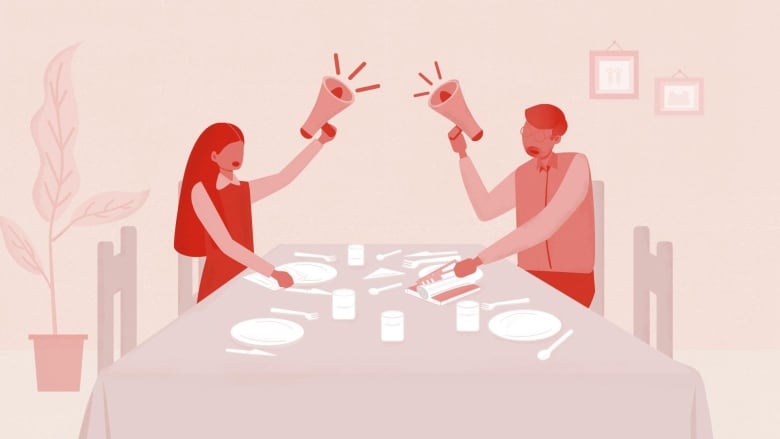Heated dinner table arguments with my father shaped me into who I am
Our impassioned debates about politics and racism became a ritual for us

This First Person column is written by Alysha Mohamed who is a student at Queen's University in Kingston, Ont. For more information about CBC's First Person stories, please see the FAQ.
When I was in high school, setting the dinner table was like preparing for battle.
My father and I would sit across from each other each evening, warming up by running through news headlines and highlights from our respective days.
We'd spiral into an impassioned debate about politics, racism, or some combination of the two within the first 10 minutes. From the sidelines, my half-amused, half-disapproving mom and sister bore witness to the timeless clash between a fiery first-born daughter and her equally passionate immigrant father.
Between mouthfuls of dinner, I would sharpen my debate skills, chewing carefully practised statistics and spitting them out with ease. Though most of our conversations ended with me angrily wiping away tears and storming upstairs to my room, they shaped me into the advocate, writer, and woman I am today.
My dad and I were always on the same page when it came to fighting for what was right, but the approaches we took could not have been more different.
While I was bold in calling out people and ideas I perceived as wrong, my father was stubborn. I couldn't understand why he didn't want to protest in the way I needed to — to call out racism without regard for the consequences.
As a slightly hormonal 16-year-old, any counterpoints my father made felt like personal attacks, and his words cut deep.
In retrospect, some of his points were a wake-up call.
My dad argued against affirmative action, saying that hiring should be solely be influenced by a candidate's merit. I couldn't understand why he, a man of colour who had been rejected and discriminated against because of his Muslim name and appearance, wouldn't be in favour of trying to level the playing field.
Though I still disagree with him, he made me realize how I will often be perceived as a "diversity hire" regardless of how talented and hard-working I may be. This reality sparked my desire to be excellent in my academic, creative, and political pursuits, but also reinforced that I need to be twice as good as my white counterparts.
When I decided to pursue what for many immigrant kids is a non-traditional path in the arts, I often felt that my father didn't believe in me as a writer. However, I see now that he was trying to protect me from uncertainty, rejection, and the possibility of unstable income.
Our fights turned into a sort of ritual.
He pushed me; I adapted. I pushed him; he learned to listen. It was in this tension, this give-and-take where we learned the most about one another.
Dinner table arguments, in many ways, became the foundation for my sense of self.
It was in these conversations that I learned which ideas I was willing to defend. I learned to bend. To open my ears and my heart. To change my mind without feeling like I had given up part of who I am.
I pointed out the microaggressions that surfaced in my dad's stories and anecdotes. I pushed him to examine his own biases — whether they were about different racialized groups, our own South Asian community, or gender and sexuality.
And when I was able to get my dad to acknowledge the weight of his words and open his mind, I felt pride coursing through my veins.
Over time, dinner conversations have calmed down. I'm not sure if time apart and age have softened us both — regardless, I'm thankful for the switch.
There's no one in my life that I'll fight with the way I fight with my dad. But there is also no one who will fight for me like he does. Our differences melt away any time I have a negative experience or I'm forced to stand up for myself, and he always has my back with the same rigor and passion that ground our dinner table arguments.
At the end of the day, I am my father's daughter. I'm bold, stubborn, and always ready to speak my mind.
But most of all, I know I'm strong. Not many people would be able to sit through a 2017 dinner table debate in the Mohamed household.
If I could survive those battles, I can survive anything.
Oh, and when I showed him this column, he said he was proud of me — which is all I could ever really ask for.
Do you have a compelling personal story that can bring understanding or help others? We want to hear from you. Here's more info on how to pitch to us.

